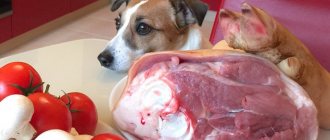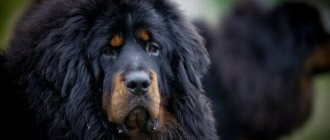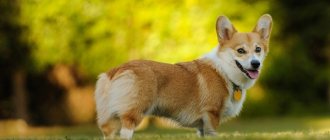German Shepherds are a strong and resilient dog breed, but they are prone to problems related to the digestive system.
The reason is the relatively short gastrointestinal tract, which requires feeding with high-calorie, but easily digestible foods.
In addition, high intestinal permeability, enzyme activity, stress placed on joints due to physical activity and other characteristics of this breed also need to be taken into account when creating a pet’s feeding diet.
Natural food or artificial feed
In caring for a German Shepherd, feeding plays one of the primary roles.
The main thing to remember when creating a diet for German Shepherds is its nutritional value and balance. The harmonious development of the dog, its health and life expectancy depend on this.
Both industrial feed and natural products are suitable for feeding..
Mixed nutrition is also acceptable, but only subject to additional rules, such as, for example, a ban on mixing both diets in one feeding.
However, in this case, attention to the pet’s health should be even more careful.
The natural menu is distinguished by its variety and the absence of chemical additives such as artificial colors, flavors and taste enhancers . In this case, the owner will have to prepare fresh food especially for the pet every day.
Ready-made food has a balanced composition, enriched with essential micro- and macroelements, it is easy to use and can be stored for a long time, but such a diet is much more expensive than a natural diet.
Expert opinion
Kozhevin Semyon Kirillovich
Expert dog handler.
Experienced breeders prefer natural food because it is a more budget-friendly option. The main disadvantage of such a diet is the tendency of German shepherds to allergies, but in this case it is enough to simply remove the product from the menu that causes an undesirable reaction in the dog. If this does not help, you should switch your pet to commercial food. But this must be done carefully and gradually, so as not to provoke problems with the gastrointestinal tract.
Acana Puppy Large Breed, 11.4 kg
Acana Puppy appeals to every furry friend and turns into a favorite bowl. Transforms the animal's fur into smooth and silky, bones will be stronger, and more energy will appear. Thanks to these crackers, your beloved friend is provided with a balanced diet. Many breeders of our smaller four-legged brothers recommend them to everyone else. This is a holistic class.
pros
- Natural.
- Without smell.
- Large packaging.
Minuses
- High price.
- There is a fishy smell.
General recommendations
Healthy feeding of a German Shepherd requires the following rules::
- food should be warm;
- it is necessary to adhere to the feeding regime;
- if it is necessary to change the diet, this should be done gradually;
- the bowl of food should be placed at the level of the pet’s chest - this will help avoid problems with posture;
- clean drinking water should always be freely available;
- the diet should be based on animal proteins;
- overfeeding should not be allowed;
- The shepherd dog should eat a single portion of food within 20 minutes; if there is food left in the bowl, it must be removed and the portion subsequently reduced.
Due to the digestive characteristics of dogs, food should be thick and contain a minimum of liquid . The optimal consistency is thick sour cream or puree.
Purina Pro Plan Optiderma for Healthy Skin and Coat, Salmon with Rice, 14 kg (Large Breeds)
A healthy body and the well-being of an animal are the result of its optimal nutrition. Purina Pro Plan was developed by Russian veterinarians and nutritionists. The composition includes specially selected nutritional components for four-legged pets of different sizes, weights and ages. It suits even special preferences and keeps the animal in excellent condition. Belongs to the premium class.
pros
- Decent composition.
- Wide range for any age, size.
- Nutritious with all the vitamin complex.
Minuses
- Flavoring additive.
- Doesn't cause much appetite.
- Not available everywhere.
- Creates increased gas formation.
Advantages and disadvantages
The main advantage of a natural diet is that the dog owner can independently choose the highest quality and freshest products..
This menu contains no preservatives, artificial flavors, flavor enhancers or dyes; it is better absorbed, and all nutrients are of natural origin.
CAREFULLY!
A significant disadvantage of this type of nutrition is the large amount of time it takes to prepare food for your pet and the need to study information regarding the balance of the menu.
In addition, cooking for a dog every day is inconvenient for those who often travel with their pet.
With a natural type of food, it is necessary to give the dog additional vitamins and minerals..
Authorized Products
A German Shepherd's natural diet should include::
- lean meat and offal;
- rice, oatmeal, buckwheat porridge;
- vegetables and herbs;
- boiled sea fish;
- dairy products;
- chicken, quail eggs;
- fruits.
You should also include a small amount of vegetable oil in the menu - it promotes the absorption of natural vitamins.
Particular attention must be paid to the amount of calcium received - often shepherd dogs have an excess of it, which leads to the development of pathologies.
What is strictly contraindicated
You can't feed German Shepherds:
- small and tubular bones;
- pasta and bakery products;
- barley;
- sausages, smoked meats, sweets, fried and peppered foods;
- potatoes, legumes;
- fatty meat;
- grapes, raisins;
- mushrooms;
- river fish;
- semolina, millet, pearl barley porridge;
- citrus fruits;
- nuts and seeds.
Undesirable foods include exotic fruits, as well as plums, apricots and peaches - their consumption can lead to gastrointestinal upset.
You cannot feed your dog leftovers from the communal table..
Almo Nature Holistic beef 12 kg (for large breeds)
Italian crackers of excellent quality with meat additives do not violate European standards. They have the aroma of real meat, causing an excellent appetite in your beloved pet. They contain protein, but in minimal quantities. The animal receives adequate nutrition by consuming it regularly. Almo Nature belongs to the super premium category.
pros
- Dogs love its taste.
- Hypoallergenic.
- Wide range of tastes.
- Fresh natural ingredients.
- There are no artificial additives, dyes, preservatives, or flavors.
Minuses
- Sometimes causes hair loss.
- The pet may refuse to eat it.
Menu for the week (table)
| Day of the week | Daily diet |
| Monday | Carrot salad with sour cream, rye croutons, beef, oatmeal, egg yolk |
| Tuesday | Curdled milk, light cookies, boiled liver, baked pumpkin |
| Wednesday | Ryazhenka, boiled fish, buckwheat porridge, vegetable oil, herbs |
| Thursday | Low-fat cheese, dried fruits, boiled chicken, cabbage and zucchini |
| Friday | Low-fat cottage cheese, boiled beef kidneys, buckwheat and carrots, apple |
| Saturday | Curdled milk, croutons, boiled veal heart, rice, rutabaga, greens |
| Sunday | Ryazhenka, apple, sunflower oil, oatmeal, zucchini stewed with carrots, tomatoes, herbs and butter, chicken necks |
Industrial feed
Like natural food, industrial food has certain advantages and disadvantages.
pros:
- convenience and ease of use;
- saving time and effort on preparing food for the dog;
- balanced composition;
- long shelf life;
- the ability to choose the appropriate food based on the dog’s age, activity level and health status.
The disadvantages include:
- content of low-quality meat and offal in inexpensive feed;
- the occurrence of allergies in case of incorrectly chosen food;
- contains artificial flavors, dyes and other chemicals.
When feeding dry food, the formation of tartar is possible, so as a preventive measure, you should give your pet boiled cartilage once a week.
Ready-made industrial food is represented not only by dry, but also by wet food - they contain up to 85% liquid and have a shorter shelf life.
All industrial feeds are divided into 4 classes:
- holistic – made from high-quality meat, fruits, plant components, containing extracts of medicinal herbs;
- super premium - contains vegetables, fresh meat, vitamins and minerals;
- premium – contain vegetables, grains, pellets of meat and offal, possibly containing dyes and flavor enhancers;
- economy - contains ground bones, cartilage and tendons, a large amount of vegetables and grains, preservatives, flavorings and dyes.
High-quality food for a German Shepherd must meet the following indicators::
- it must be local or imported, and not manufactured under license;
- granules should not be greasy;
- the composition should contain grains, but not soy or beans;
- It is better to purchase food in original packaging rather than in bulk.
In high-quality industrial feed, the ratio of BPJU must be balanced; the energy value cannot be less than 350 calories per 100 g of product.
Diet from one month to six months
From 1.5–2 months, raw vegetables, in small quantities and well chopped, begin to appear on the puppy’s menu. From time to time, the pet is given bran from cereals (a storehouse of fiber), such as oats, rye and wheat. They are easy to digest and act as a breeding ground for microorganisms that inhabit the intestines. Bran can be used to enrich both meat and dairy dishes: the optimal dose for a puppy is a pinch. Constant intake of bran is contraindicated, since in large quantities they bind and remove calcium from the digestive tract.
Important! When the puppy is completely weaned from the mother's breast, he needs to be given 6-10% protein food (of his weight), divided by the number of daily feedings. As a rule, this is medium-fat cottage cheese and meat ingredients in a 50/50 ratio.
From one and a half months, it is recommended to add raw cartilage/bones (which supply calcium), starting with chicken necks and heads, as they are quite soft. However, at first, these fragments of carcasses are beaten and passed through a meat grinder. A two-month-old pet eats almost the same as an adult German Shepherd. The owner introduces him to offal, different types of meat (duck, turkey, chicken) and fish. All products are served without heat treatment.
At this age, the puppy begins to actively use its teeth, so any pieces of carcass are given as is, without beating. You can already give the shoulder blade and other large bones, from which cartilage and meat are cut. This loads the jaws, at the same time cleaning the teeth and facilitating their painless change. Fresh fish is also a source of calcium, preferably sea and fatty fish, since fish oil improves the appearance of dog skin/fur. Puppies are given fish with bones, ground in a meat grinder. Chicken eggs (if allergies are not noted) in any form are also useful - raw, scrambled eggs and boiled.
Return to content
Dry food
Feeding cheap, low-quality food leads to serious problems with the dog’s health, so for German shepherds you should choose food of at least premium class, and better yet, super-premium or holistic.
The most popular foods are::
- Acana is based on natural meat and fresh vegetables, and in lines designed for large breeds there are practically no carbohydrates, but contain a lot of proteins;
- P urina ProPlan is a premium food that may contain flavorings and flavor enhancers, which often cause allergies;
- Nutram is a super-premium or holistic food, made on the basis of natural products that have quality certificates;
- Genesis – there are lines of food intended for veterinary diets and holistic food; the Deep Canyon Adult line, containing more than 70% meat, is suitable for German shepherds;
- Happy Dog - there are both premium and economy class food lines, while some feeding options, despite the low price, are not inferior in quality to brands such as Hills or ProBalance.
All these brands of industrial feed have the following advantages:
- long shelf life;
- relatively small daily intake;
- the composition, which includes meat, cereals and vegetables, is enriched with vitamins.
You should accustom your German Shepherd puppy to dry food immediately after finishing feeding him natural milk.
Belcando Junior Maxi for large and giant breed puppies from 3 to 18 months (15 kg)
Many experts recommend Belcando Junior, made in Germany, for large dogs. Its composition is rich in a high content of poultry meat, in addition to easily digestible rice, which helps good digestion and absorption of useful components. The recipe contains carob fruits, which contain tannins and substances important for life that have an effect on proper digestion. Belongs to the super premium class.
pros
- A complete, balanced complex of nutrients.
- Healthy pet.
- Convenient, economical packaging.
- A wide range of.
- Availability.
- German quality.
Minuses
- Causes an allergic reaction.
- Not all dogs like it.
- Not sold in all Russian cities.
- Composition with sodium chloride.
- Large granules of strange color.
- Poor combination with vitamins and other products.
- There is a minimum of meat, but a maximum of cereals.
Vitamins and supplements
The most popular supplements for German Shepherds are::
- 8 in 1 – promotes the full development of the dog, even in the presence of a genetic predisposition to pathologies;
- Nutri-vet is the best remedy for restoring your pet’s joints, containing vital glucosamine;
- Beaphar - the drug contains vitamins B, A, D3, iodine, manganese, calcium, biotin, potassium, sodium, phosphorus, its intake reduces the risk of infection, improves the general condition of the dog, its activity and the condition of the teeth, claws, skin and coat cover;
- Kanvit – contains Omega-3 and 6 acids, which improve the quality of coat, skin, reproductive function and immunity;
- Gelacan Darling – promotes the restoration of joints and tendons;
- Cani Agil – contains glycosaminoglycan and Omega-3, has a beneficial effect on the functioning of tissues, cartilage and joints, recommended in case of malfunction of the musculoskeletal system, high load on the joints or problems with them due to age-related changes and during the growth of the pet .
The wrong choice of vitamins or their dosage can cause gastrointestinal upset, so you should consult a veterinarian before use..
Feeding the puppy
The table below shows the menu for a shepherd puppy :
| Age | Daily ration | Number of feedings |
| 0-1 month | Mother's milk | 8-10 |
| 1-2 months | 100-200 g meat, 80-100 g cereals, 130-150 g vegetables and herbs, 400-450 ml milk | 6 |
| 2-3 months | 200-300 g meat, 100-150 g cereals, 450-500 ml milk, 150-170 g herbs and vegetables | 5 |
| 3-4 months | meat – 300-400 g, cereals – 150-200 g, herbs and vegetables – 170-190 g, milk – 500 ml. | 5 |
| 4-5 months | 400-450 g meat, 200-250 g cereals, 190-210 g vegetables, 0.5 l. milk | 4 |
| 5-6 months | 450-500 g flour, 250-300 g cereals, 210-250 g vegetables and herbs, 1/2 l. milk | 3-4 |
Give your shepherd 1 egg twice a week..
After six months, the German Shepherd puppy should be gradually transferred to a two-time feeding regimen.
Nutrition for an adult dog
The active growth of a German Shepherd lasts up to 1 year; up to 3 years, the dog continues to develop: the skeleton becomes stronger, the shade of the coat changes, and the pet builds muscle mass.
IMPORTANT!
The feeding diet of an adult shepherd should include not only basic foods, but also drugs that promote the restoration of cartilage and bone tissue.
Elderly dogs need to receive daily proteins, calcium, magnesium, potassium, phosphorus, vitamins and chondroprotectors that minimize the risk of developing age-related pathologies of the musculoskeletal system.
The daily diet should consist of equal parts of meat, buckwheat and rice porridge, vegetables and dairy products.
If milk is the cause of diarrhea in your pet, it should be excluded from the menu.
Vegetables
An adult shepherd can be fed vegetables. The opinions of veterinarians are still divided. Some say that feeding your pet vegetables is not worth it and this has a bad effect on the functioning of the gastrointestinal tract. Others argue that if the pet does not object to this food and there are no negative consequences for a long time, then it is possible.
Vegetables themselves are rich in vitamins of various groups. Fruits also contain a large amount of pectin, which allows you to remove heavy metals from the body and get rid of excess cholesterol. Vegetables can be given to your pet either raw or boiled. You only need to exclude fried processing. Shepherds especially love stewed or boiled cabbage, raw carrots and boiled beets. If the owner prefers to give vegetables and make sure that the pet receives vitamins directly from the products, then he can grate the vegetables on a coarse grater and present his four-legged friend with a salad.
How to avoid obesity
The tendency of German Shepherds to become obese is one of the reasons for careful monitoring of the quality and volume of food they consume and strict adherence to the feeding regime.
Your pet needs regular exercise and nutrition appropriate to its activity level .
If signs of excess weight gain appear, you should review your dog’s diet, reducing its calorie content.
Pedigree for healthy skin and coat, beef, 13 kg (for large breeds)
PEDIGREE helps reduce the risk of tartar and plaque formation on your pet’s teeth. Provides him with normal digestion. It is preferable to feed your pet dry food in a container separate from wet food, and ensure the availability of fresh drinking water. This is quite healthy, tasty dog food. It is produced taking into account the physiological needs of a large four-legged pet. The food is produced by a Russian company and is designed for the economy category.
pros
- Convenient packaging.
- Pleasant aromatic and taste properties.
- The pet eats with pleasure.
- No artificial flavors.
- High quality crackers.
- Comfortable in using.
- Lots of vitamins.
- The coat takes on a healthy, beautiful appearance.
Minuses
- Negative reputation.
- Missing useful components.
- Worse than normal nutrition.
- Doesn't do any good.
- Harmful to the health of the animal.
- The pet quickly gets used to this food and does not eat anything else.
- Increases salivation.
Feeding during pregnancy
A pregnant bitch should be fed 3 times a day, increasing the portion size by 1/3. The dog should be given fish several times a week, and more often fed with cheese and cottage cheese - this will increase the intake of calcium and phosphorus into the pet’s body.
From the 2nd half of pregnancy, you should increase the amount of vegetables and fruits you consume; in winter, you need to give additional vitamins A and D.
From the 2nd month of pregnancy, meat should be completely replaced with fish at the rate of 150 g of fish instead of 100 g of meat. In the last week of gestation, the bitch should be fed at least 5 times a day.
After giving birth, the dog needs to be offered food at least 4 times a day; the usual diet can be restored only after the end of the lactation period.
Also read about how German Shepherds go into heat.
How to properly feed a German Shepherd puppy: feeding schedule and daily food dosage
For three weeks from the moment of birth, the baby feeds exclusively on mother's milk. After this period, the puppies begin to be fed meat, cereals and fermented milk products, gradually accustoming them to adult food. Starting from the age of two months, the bitch stops feeding the puppies, and they completely switch to solid food.
From one month to one year, the baby actively grows, the formation of muscle and cartilage mass, skeleton and immunity. And the owner’s main task during this period is to provide the small pet with proper and balanced nutrition. Moreover, it is important not only to choose a good diet, but also to adhere to the puppy’s feeding schedule.
How much and how often to feed puppies of different ages:
- In the first 2 months, babies eat six times a day. The daily food intake is one glass, which is divided into six equal servings;
- The dosage of food for three-month-old puppies is increased to one and a half glasses of food. Pets are fed up to five times a day;
- From the age of 4 months, the puppy is transferred to four meals a day. The recommended dose of food per day is two glasses;
- The frequency of feeding puppies from 5 to 6 months is reduced to three times a day. The daily serving volume should be one liter of food;
- from 6 months to a year, the dog continues to be fed three times a day, and the norm for a single serving is half a liter of food;
If there is a need for additional feeding of puppies at the age of two to three weeks, for example, when the bitch has little milk, then the frequency of feeding them should be five to six times a day. They feed babies with cow's milk or, even better, goat's milk from a bottle or syringe, or use baby formula for this purpose.
Important: the break between feeding puppies from one to six months should not exceed two to four hours.











